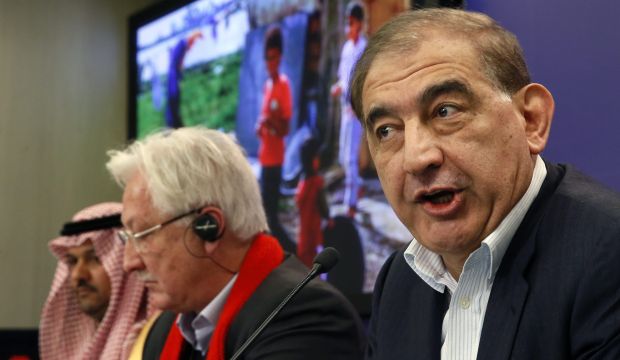
Leader of the Popular Front for Change and Liberation, Qadri Jamil (R), attends a press conference in Moscow, Russia, on January 30, 2015 after talks between representatives of the Syrian government and the opposition. (EPA/Yuri Kochetkov)
Moscow, Asharq Al-Awsat—The Syrian government said Thursday it was ready to host talks with opposition figures in Damascus to discuss demands for prisoner release and improved humanitarian conditions, according to a key Syria-based opposition group.
The talks would likely be held between the government and the opposition groups that attended this week’s talks in Russia.
Members from the fractious Syrian opposition and representatives of Syrian President Bashar Al-Assad’s government ended a four-day meeting in Moscow on Thursday without making any real progress regarding a political settlement for the Syrian crisis.
The meeting, boycotted by the main Syrian opposition group the Syrian National Coalition (SNC), drew up a 10-point plan calling for a political settlement, based on the Geneva Communique. The points stated the rejection of foreign militias in Syria and backed the Syrian armed forces as a symbol of national unity.
Majid Habo, the secretary of the National Coordination Committee (NCC), which participated in the Moscow-hosted talks, said his group “neither objected to nor adopted the plan given it represents the point of view of the Russian sponsor.”
Russia is a key backer of Syrian President Bashar Al-Assad whose government has been fighting armed rebel factions for four years.
The plan was adopted by “the so-called civil society and tribal groups who represent the regime more than the opposition,” he said.
Participants at the talks are mostly Syrian-based opposition members and activists tolerated by Damascus.
“The agreement was limited to the bare minimum due to the strictness of the government delegation which, it became clear, was not authorized to complete any understanding,” he added.
The two sides agreed to hold another round of talks in Moscow set to take place next month, the Russia Today TV channel said.
Hisham Marwa, the vice president of the SNC, whose members turned down the Russian initiative, said the talks were expected to fail and that they were meant by Moscow “to push some opposition factions to the front as a prelude to returning them to the regime’s side.”
No solution came out of the talks, Marwa said.
He said: “We cannot accept that the army with its current leadership, which has gone too far in crimes committed against the Syrian people to be responsible for leading the next transitional period.”
Marwa called for the holding of a third round of talks between the Syrian government and the opposition in Geneva. Two Syria peace conferences were previously held in Geneva in June 2012 and January 2014 but broke down after failing to reach a compromise.
“Moscow has proved not to be serious and incapable of moving forward with a political solution,” Marwa said of the most recent talks held in Russia.
The Western-backed Coalition group insists that any political solution for Syria should be based on the Geneva Communique that was issued after the first Geneva conference, which calls for the formation of a transitional body with full executive powers.
Qadri Jamil, of the Popular Front for Change and Liberation—an umbrella group of 16 Syria-based opposition parties—said he was satisfied with the outcomes of the Moscow talks.
“It is the first direct meeting to have brought together the Syrian opposition from across the spectrum and the government since the start of the crisis,” the former Syrian deputy prime minister told Asharq Al-Awsat.
“The Moscow meeting prepares for a prolonged process that will only stop when a political solution has been achieved.”
